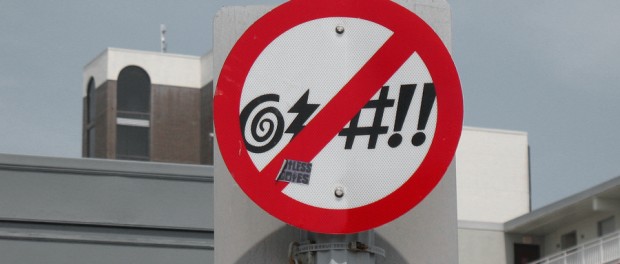The Bible on Swearing

As with other discussions about language, this post contains words that may offend certain readers. If you’re offended by these words, feel free to skip reading this post and move on to less offensive topics, like dwarf bunnies.
It never ceases to amaze me how readily some (if not most) Christians get offended by hearing people cuss.
When I first became a Christian, I was quickly informed of the importance of cleaning up my mouth, getting rid of any music that included a word from a God-ordained blacklist, and stopping my watching of any movies or television that had such words. I thought the idea strange — one series of sounds from someone’s mouth forms an unacceptable word while another series of sounds makes an acceptable word. Sounds are sounds, right? But like a “good” Christian noob, I obeyed first and asked questions later.
The church emphatically teaches that swearing—another word for cussing, or using forbidden words—is prohibited by the Bible.
I quickly saw the church emphatically taught that swearing—another word for cussing, or using these forbidden words—was prohibited by the Bible. These “swear words” could not be used by any holy Christian; they were the offensive to the ears of the Almighty.
A @#$&;;% Quagmire
Forgive me, but this seemed a logistical nightmare.
- Which words were truly swear words? I can’t say “damn” but I can say “dang”, or are substitutes equally forbidden, even if uniquely invented (a la Battlestar Galactica’s “frak”)?
- Are there exceptions—am I to be offended when a dog breeder says “bitch”?
- What about partial words that string together the forbidden sound combinations—can I ever refer to shiitake mushrooms or Shih Tzus by their common (mis)pronunciation?
- What about all these asses in the Bible? Are donkeys acceptably called “ass” but the buttocks are not?
What did the Bible have to say about these details of swearing?
In All Honesty
I was, as you might guess, wholly disappointed when I decided to search for the answers for myself. The Bible does not contain a compendium of “true” swear words, it offers no advise about handling dog breeders and their bitches, and it’s highly silent on the subject of Asian mushrooms and canines. In fact, it’s notably silent on the subject of swear words at all.
I learned the Bible’s prohibitions on swearing have nothing to do with bad words or obscenities or explicit lyrics or dirty mouths or foul language. They’re admonitions to honesty.
If adding “I promise” or “I swear” into the mix makes it more binding to me, then I was willing to compromise my honesty (and therefore my Christian integrity) in the first place.
Jesus (in Matthew 5:32) and James (James 5:12) prohibit swearing in the form of oaths — that is promising to do something as a stronger vow than just saying you’ll do something. They both teach that swearing shouldn’t be necessary for a Christian. If I say, “Sure, buddy, I’ll help you move next month,” I should mean it. If adding “I promise” or “I swear” into the mix makes it more binding to me, then I was willing to compromise my honesty (and therefore my Christian integrity) in the first place.
This is excellent teaching on a nuance that might otherwise be overlooked, but it has nothing to do with bad words.
None of the Greek or Hebrew words used regarding to swearing have anything to do with prohibited words wither. It’s all about oaths. Actual swearing.
Cursing, Maybe?
So I learned the biblical depiction of “swear words” was as follows: promise, swear, vow, pledge. A far cry from what I’d been led to believe.
But the Bible doesn’t just prohibit swearing and swear words. It also prohibits cursing and curse words. So maybe cussing does get addressed…
Originally posted 2015-08-03 08:00:30.


Leave a Reply